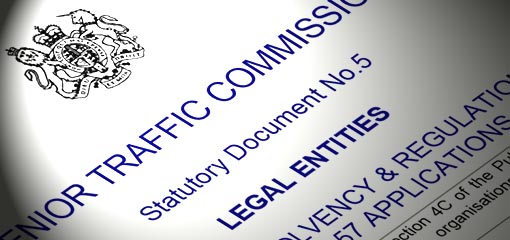
Keeping on top of everything that affects your business can be a challenge at the best of times. Sometimes making a change to one part of your operation can have an effect on another.
This is often the case when a business changes its legal status.
Tom's tale
Take Tom – a sole trader running two vehicles for his scaffolding firm. After getting advice from his accountant, Tom set up a limited company.
It’s a routine business decision. But as soon as the change takes place, Tom’s operator licence becomes invalid. This is because operator licences are not transferable.
Traffic commissioners grant operator licences to the entity that applies for the licence. Most commonly, you will either be a sole trader, partnership or limited company.
The legislation covering operator licensing says that the operator of the vehicles has to hold the licence. So in Tom’s case, when the limited company starts running vehicles, it must have its own licence. Tom’s sole trader authority does not cover the limited company’s operations.
Traffic commissioners see many cases, sometimes at public inquiry, where operators have changed entity without having given notice or applied for a new licence. There’s a condition on every operator’s licence to give notice if there is a change of entity.
Tom put his licence at risk by not taking action before moving to a limited company. It meant he was running illegally for several years. This also put the new business in a difficult position going forward. The Traffic Commissioner’s Office told Tom his sole trader licence was not valid and that he would need to apply for a new licence. This meant Tom had to pay for another operator to do his work while his application was being considered.
If you change your entity, apply for a new licence
If you change your business entity you must apply for a new licence. This includes publishing an advert in the local paper and submitting the right financial information. Although you can ask for an interim licence, there may be a period of time where you have no licence in force, because your existing licence will no longer be valid. An interim licence will only be granted once the relevant criteria are met.
There is a way to manage this disruption. If you are thinking of changing your business entity, make sure you prepare your new licence application at the same time. You can contact the Central Licensing Office for advice on what you need to do to stay compliant while your application is under consideration.
Continuing a licence under regulation 31
There are other occasions when you can apply for the continuation of an operator’s licence – such as if the licence holder is in administration or has become personally bankrupt. The Senior Traffic Commissioner has produced guidance on what to do in these circumstances. The document ‘Legal entities’ on GOV.UK explains how and in which specific circumstances, an operator’s licence can continue for a period of time under a regulation 31 order.
Goods vehicle operator licence forms
Leave a comment